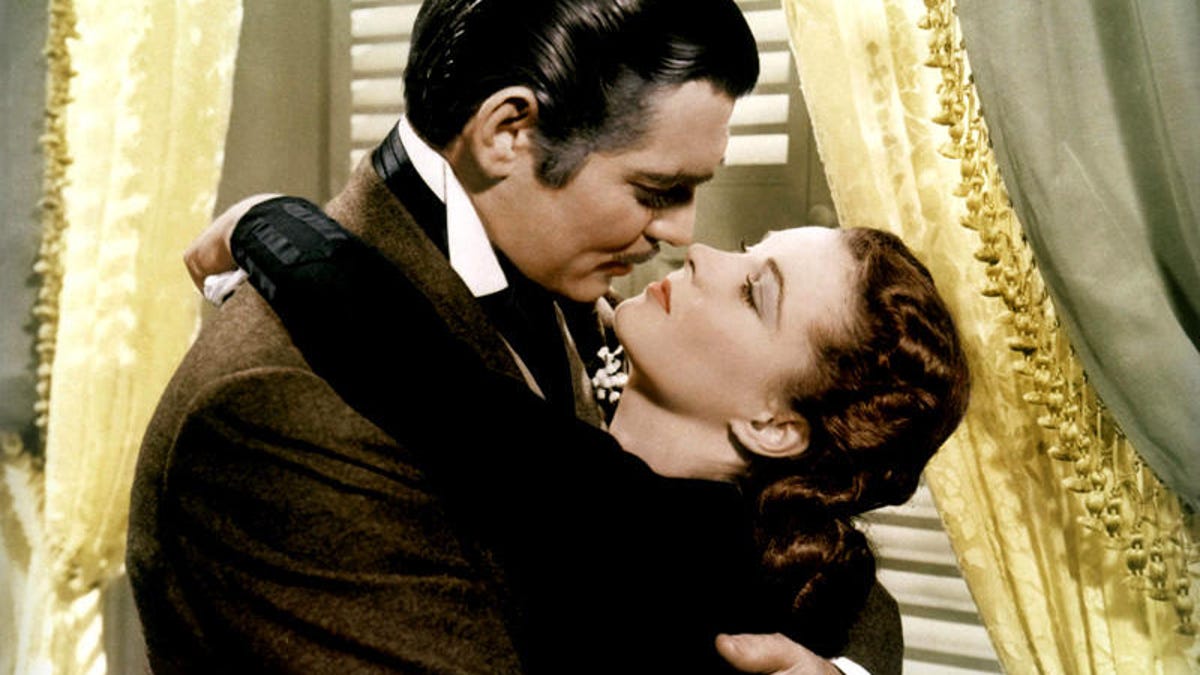HBO Max will re-release Gone With the Wind with new introduction
Cinema professor and TV host Jacqueline Stewart will offer historical context for the controversial film.

Gone With the Wind received 10 Academy Awards.
More details were revealed Saturday about how the Oscar-winning 1939 drama Gone With the Wind will return to HBO Max. The film was pulled on June 10 due to "racist depictions" and the new streaming service said at the time only that it would eventually be brought back with historical context. Over the weekend, author, TV host and University of Chicago cinema and media studies professor Jacqueline Stewart wrote on CNN that she will provide an introduction to the film when it is once again available. There's still no date for the film's return.
"The film romanticizes slavery as a benign and benevolent institution," Stewart said in the CNN editorial, noting that the Civil War epic does not show slavery's physical abuse, grueling labor, or separation of families.
Yet Stewart, who hosts Silent Sunday Nights on Turner Classic Movies, believes the film should not be censored. "It is precisely because of the ongoing, painful patterns of racial injustice and disregard for Black lives that 'Gone with the Wind' should stay in circulation and remain available for viewing, analysis and discussion," she wrote.
Stewart said that her introduction would "(place) the film in its multiple historical contexts," adding, "For me, this is an opportunity to think about what classic films can teach us."
A spokesperson for HBO said the company did not have an updated statement commenting on Stewart's involvement.
"Gone With The Wind is a product of its time and depicts some of the ethnic and racial prejudices that have, unfortunately, been commonplace in American society," HBO Max, which is part of AT&T-owned WarnerMedia, said in the statement from last week. "These racist depictions were wrong then and are wrong today and we felt that to keep this title up without an explanation and a denouncement of those depictions would be irresponsible."
The company has a precedent for this kind of response. The language of HBO Max's statement, for example, is nearly identical to disclaimers that Warner Bros., another WarnerMedia company, have put before certain Looney Tunes cartoons rereleased on DVDs or streaming services since 2005.
looks like HBO borrowed from the old WB cartoons disclaimer pic.twitter.com/3lJz1NK6Qg
— Scott Weinberg (@scottEweinberg) June 10, 2020
HBO Max's action on Gone with the Wind came a day after Oscar-winning screenwriter John Ridley, in an editorial published Monday in the Los Angeles Times, urged HBO Max to temporarily remove the film. His call to HBO Max came amid two weeks of worldwide protests against racism and police brutality after a Minneapolis police officer pressed his knee into the neck of George Floyd, a 46-year-old black man, for nearly nine minutes on May 25, killing him.
The headline on Ridley's editorial reads, "Hey, HBO, 'Gone With the Wind' romanticizes the horrors of slavery. Take it off your platform for now."
See also: Black Lives Matter: Movies, TV shows and books on systemic racism
HBO isn't the only entertainment giant rethinking programming choices in light of Floyd's death in the custody of police. On June 8, Paramount Network canceled the long-running police reality show Cops. (Disclosure: Paramount Network is owned by ViacomCBS, the parent company of CNET.)
And other streaming services have grappled with how to deal with classic titles containing racist or otherwise offensive stereotypes, now streaming to modern audiences. When Disney Plus launched last year, the plot descriptions for titles like Dumbo, The Jungle Book and Lady and the Tramp included a warning that the titles contain "outdated cultural depictions," and the films are being presented as they were originally created.
But another controversial Disney title was excluded entirely from its streaming collection. Song of the South, which is the source of the song Zip-a-Dee-Doo-Dah and the basis for the Disney theme park ride Splash Mountain, has long been criticized for its depictions of formerly enslaved black Americans. The full film has never been released for home viewing and it wasn't included in the Disney Plus catalog either. The movie is "not appropriate in today's world," Disney Executive Chairman Bob Iger said in March.
Gone With the Wind is based on Margaret Mitchell's epic 1936 novel about the life and loves of Scarlett O'Hara, a plantation owner's daughter who struggles to survive the American Civil War and its aftermath. The book won a Pulitzer Prize for fiction.
The film version starred Vivien Leigh as Scarlett and Clark Gable as her love interest, Rhett Butler. It won 10 Academy Awards, including best picture, best director, best adapted screenplay and best actress for Leigh. Hattie McDaniel, who played a slave called Mammy, won for best supporting actress, making her the first African American to win an Oscar. Yet due to Jim Crow laws in Georgia, McDaniel wasn't allowed to attend the film's 1939 Atlanta premiere.
Update, June 15 at 4 p.m.: Adds information about Jacqueline Stewart's planned introduction.



